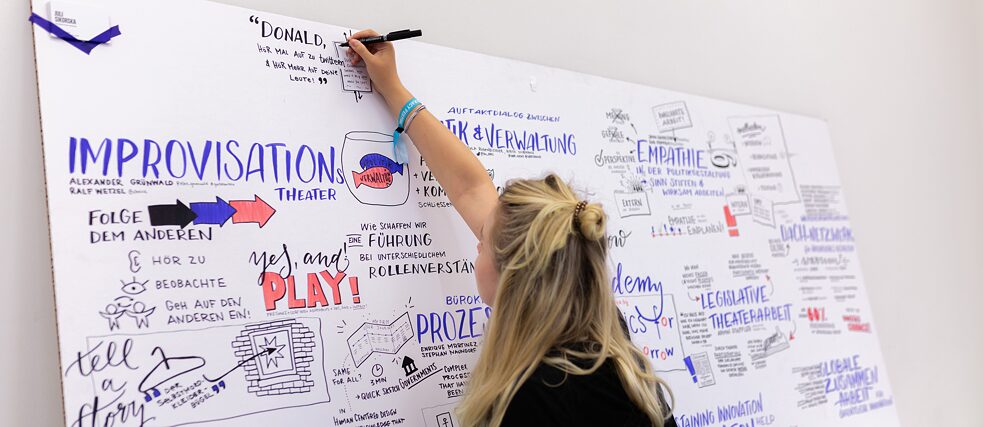Officialese
Officialese Is Still Incomprehensible

Manuals, deliberations, data analysis tools... For about twenty years now, experts have been struggling to make German officialese more comprehensible. But there’s still a lot of work left to do.
“German paragraphs and grammar have something in common,” quips German-Iraqi writer Abbas Khider in his book Deutsch für alle (German for All): “they’re enough to make you weep.” Even native speakers with university degrees despair from time to time over official letters, forms and legal documents they simply don’t understand. In a survey conducted every two years by the German Federal Statistical Office, respondents do give high marks for some services, such as the forms for applying for identity papers. On the whole, however, most Germans say they’re still dissatisfied with German officialese.
Why all the bureaucratic gibberish?
In some other languages, it’s grammatically impossible to construct the kind of deeply nested sentences used in German, or verbal behemoths like Umsatzsteuerschlüsselzahlenfestsetzungsverordnung (i.e. VAT Allocation Coding Act) or SARS-CoV-2-Eindämmungsverordnung (SARS-CoV-2 Containment Act). And yet an international comparison shows that the structure of the German language is not the root of the problem. “Administrations in other countries have the same problems we do,” says Professor Christine Möhrs, who is working on “comprehensible officialese” at the Leibniz Institute for the German Language (LDS): “complicated words, long sentences, poorly structured texts and impersonal tone.” She is in close contact with colleagues in other European countries and, among other things, has analysed the European Commission's guide to How to write clearly, which is available in 24 languages.Officialese is based on laws. So administrators have to choose legally safe wordings and remind people of their legal obligations. This is correct and this is what they’re traditionally taught in administrative training. Unfortunately, however, the civil service in some cases still unthinkingly clings to established institutional practices that are bound up with a historically authoritarian mind-set. “This is a vestige of absolutism,” says Lothar Wiegand, who works in a German ministry himself and gives seminars on how to avoid using bureaucratese. “Even the Old Fritz [Frederick the Great] complained about Prussian officialese and ordered his ministers to express themselves to the people comprehensibly.”
The language of officialdom can also be perceived as impersonal, even condescending. Professor Frank Brettschneider at the University of Hohenheim in Stuttgart zeroes in on this aspect in his research on comprehensible communication and gives an example: “The authorities often instruct people to submit certain documents fristgerecht (‘by the deadline’). But such a peremptory tone is outdated and counterproductive. It would be friendlier, more sensible and no less legally compliant to explain, for example, by what date the documents are needed and why.”
How do civil servants learn to communicate comprehensibly?
Ultimately, of course, it’s in the interest of civil servants to be understood by their addressees and to address them as equals. And a change is possible: just look at the financial sector, where communication has changed for the better in the wake of the financial crisis and the widespread mistrust it bred. Some countries, such as Switzerland and Sweden, have already made considerable headway in their efforts to render officialese intelligible.Plenty of projects and initiatives are currently working to make a change in German officialese, too – and not only in the field of so-called “plain language”, which has been developed to maximize accessibility and, under the German law on equal opportunity for the disabled, is to be used by all holders of public authority.
With his team at Hohenheim University, Professor Brettschneider has developed a “Comprehensibility Index” to evaluate texts on the basis of average sentence length and the proportion of loanwords from foreign languages, among other things. The Baden-Württemberg state government has already signed up to use the resulting software for textual analysis: it will at least enable administrative staff to readily identify which documents need revising. But people will still be needed to “translate” them into comprehensible writing.
A question of language – and (administrative) culture
A federal Bürgernahe Sprache (Plain Language) project is currently under way to draw up rules, revise administrative documents and develop a training plan. And the LDS is helping out by providing expertise – and monitoring the reactions of administrative staffers. “An important prerequisite for changes is that decision-makers are convinced – and have the backing of the lower levels,” explains Christine Möhrs. Another project, called MfG – Mit freundlichen Grüssen, has been designed by the Berlin start-up Flipped Job Market to bring about a change in work culture at German administrative offices. The underlying premise is that every civil servant can make a difference if they enjoy their work and realize how much discretionary latitude they have in the exercise of their functions. Creative output at the Creative Bureaucracy Festival
| Creative Bureaucracy Festival 2018 © Robert Schlesinger
The MfG project also demonstrates this discretionary latitude at the annual Creative Bureaucracy Festival in Berlin, where civil servants and others come together to discuss forward-looking approaches to administrative reform, including more comprehensible communication. Even designers get a say here – e.g. Daniela Hensel, a professor at the HTW Berlin University of Applied Sciences, who researches person-centred administration and has developed a checklist for more comprehensible official forms. “If I want to digitalize processes,” she explains, “first I have to check: Is the process clearly worded to begin with? Or is there a bureaucracy behind it that needs simplifying?”
Creative output at the Creative Bureaucracy Festival
| Creative Bureaucracy Festival 2018 © Robert Schlesinger
The MfG project also demonstrates this discretionary latitude at the annual Creative Bureaucracy Festival in Berlin, where civil servants and others come together to discuss forward-looking approaches to administrative reform, including more comprehensible communication. Even designers get a say here – e.g. Daniela Hensel, a professor at the HTW Berlin University of Applied Sciences, who researches person-centred administration and has developed a checklist for more comprehensible official forms. “If I want to digitalize processes,” she explains, “first I have to check: Is the process clearly worded to begin with? Or is there a bureaucracy behind it that needs simplifying?”
What if all this comes a cropper?
This debate may well give a new twist to the matter of comprehensible communication in public administration. But if it doesn’t help, mandatory quality control might have to be introduced, as has been suggested by some experts. This quality control could be based on new international standards for comprehensible writing.In the meantime, German citizens and would-be citizens will have to keep fighting their way through the jungle of German bureaucratese any way they can. What this means is, for example: If something works fine, praise it. If something is unclear, ask. And if you can’t reach anyone there, think positively. After all, the Federal Statistical Office survey has also found that most people consider the German administration virtually unbribable. So when the going gets tough, patience and, as Abbas Khider shows, a sense of humour may help.